Belarus | Sudan |
|---|---|
Belarus and Sudan established diplomatic relations on 15 July 1999. [1]
Belarus | Sudan |
|---|---|
Belarus and Sudan established diplomatic relations on 15 July 1999. [1]
Belarus and Sudan have maintained good relations since several decades. Belarus exports weapons and military hardware to Sudan since 1996. In 2003, Belarus supplied Sudan with nine BMP-2 infantry fighting vehicles, 39 BRDM-2 armoured reconnaissance vehicles, 16 122 mm howitzer 2A18 (D-30) howitzer guns, 10 2S1 Gvozdika self-propelled howitzers and six BM-21 Grad multiple rocket launchers. [2] In 2007, a Sudanese delegation attended a Belarus arms show. [3] In 2013, Belarus exported Su-24 planes to Sudan. [4] In 2017, Belarusian president Alexander Lukashenko visited Sudan. On this occasion, delegations signed contracts worth $50 million. In the near future Sudan plans to test a Belarusian harvester which was especially designed for the country taking into account its climate. [5] Additionally, Belarus Energy Minister Vladimir Potupchik said Belarus is ready to take part in the construction and reconstruction of energy facilities in Sudan. [6] Also in January 2017, Sudanese President Omar al-Bashir and his Belarusian counterpart Alexander Lukashenko signed in Khartoum a Comprehensive Friendship and Cooperation Agreement between the two countries. [7]
In 2007, Sudan was one of 33 countries to vote against a United Nations General Assembly resolution titled "Situation of human rights in Belarus". [8]
In 2014, Sudan and Belarus were among 11 countries to vote against United Nations General Assembly Resolution 68/262 which would recognize Crimea as the territorial integrity of Ukraine. [9]
Both Belarus and Sudan's Rapid Support Forces support the Russian invasion of Ukraine. [10]

Belarus, officially the Republic of Belarus, is a landlocked country in Eastern Europe. It is bordered by Russia to the east and northeast, Ukraine to the south, Poland to the west, and Lithuania and Latvia to the northwest. Covering an area of 207,600 square kilometres (80,200 sq mi) and with a population of 9.2 million, Belarus is the 13th-largest and the 20th-most populous country in Europe. The country has a hemiboreal climate and is administratively divided into six regions. Minsk is the capital and largest city; it is administered separately as a city with special status.

The Sudanese Armed Forces are the military forces of the Republic of the Sudan. In 2011, IISS estimated the forces' numbers at 109,300 personnel. In 2022-23 CIA estimated the armed forces to number 100-125,000.

The foreign relations of Sudan are generally in line with the Muslim Arab world, but are also based on Sudan's economic ties with the People's Republic of China and Russia.

Alexander Grigoryevich Lukashenko is a Belarusian politician who has held the presidency of Belarus since the office's establishment on 20 July 1994, making him the longest-serving European president.
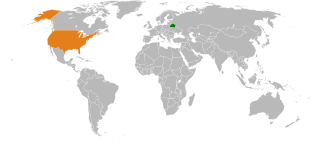
Interstate relations between the United States and Belarus began in 1991 upon the dissolution of the Soviet Union, of which Belarus had been a part. However, the relations have turned sour due to accusations by the United States that Belarus has been violating human rights. Belarus, in turn, has accused the United States of interfering in its internal affairs.

The War in Darfur, also nicknamed the Land Cruiser War, was a major armed conflict in the Darfur region of Sudan that began in February 2003 when the Sudan Liberation Movement (SLM) and the Justice and Equality Movement (JEM) rebel groups began fighting against the government of Sudan, which they accused of oppressing Darfur's non-Arab population. The government responded to attacks by carrying out a campaign of ethnic cleansing against Darfur's non-Arabs. This resulted in the death of hundreds of thousands of civilians and the indictment of Sudan's president, Omar al-Bashir, for genocide, war crimes, and crimes against humanity by the International Criminal Court.

Mutual relations between the Republic of Belarus and the European Union (EU) were initially established after the European Economic Community recognised Belarusian independence in 1991.
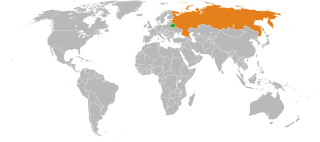
Belarus and Russia share a land border and constitute the supranational Union State. Several treaties have been concluded between the two nations bilaterally. Russia is Belarus' largest and most important economic and political partner. Both are members of various international organizations, including the Commonwealth of Independent States, the Eurasian Economic Union, the Collective Security Treaty Organization, and the United Nations.

China–Sudan relations are the bilateral relations between the People's Republic of China and the Republic of Sudan. China is currently one of Sudan's largest trade partners, importing oil and exporting low cost manufactured items as well as armaments into the country. Both states enjoy a very robust and productive relationship in the fields of diplomacy, economic trade, and political strategy. They formally established diplomatic relations on February 4, 1959, when Sudan formally recognized the sovereignty of the People's Republic of China and have since become close global allies, supporting each other in times of internal crises and international controversy such as during the Second Sudanese Civil War, the Darfur Crisis, and the Xinjiang Conflict. China continues to provide massive support to Sudan by developing its oil resources and supplying millions of dollars in loans, aid, foreign direct investments, and humanitarian assistance. In return, Sudan has become a reliable political and economic ally in the international arena, allowing China to maintain a significant stake in its oil sector.
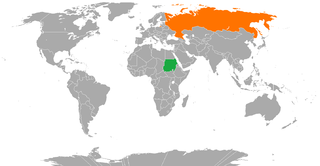
Russia–Sudan relations are the bilateral relations between Russia and Sudan. Russia has an embassy in Khartoum and Sudan has an embassy in Moscow.

Belarus and Ukraine are both are full members of the Baku Initiative and Central European Initiative. In 2020, during the Belarusian protests against president Lukashenko, the relationship between Ukraine and Belarus began to deteriorate, after the Ukrainian government criticized Belarusian president Alexander Lukashenko. In the waning days of 2021, the relationship between both countries rapidly deteriorated, culminating in a full-scale invasion on 24 February 2022. Belarus has allowed the stationing of Russian troops and equipment in its territory and its use as a springboard for offensives into northern Ukraine but has denied the presence of Belarusian troops in Ukraine. Even though part of the Russian invasion was launched from Belarus, Ukraine did not break off diplomatic relations with Belarus, but remain frozen.

Bulgaria and Sudan established diplomatic relations on July 1, 1956. In 1967, Bulgaria sent the first Bulgarian ambassador to Khartoum. The activities of the Bulgarian embassy in Khartoum were terminated in April 1990, and later reestablished in March, 2005. In 2006 the General Consulate of the Sudan, in Sofia, Bulgaria was upgraded to the rank of embassy.
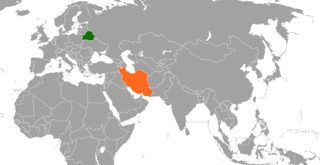
The Byelorussian Soviet Socialist Republic recognized de facto the Islamic Republic of Iran in February 1979, and Belarus and Iran established de jure diplomatic relations in 1992. Belarus has an embassy in Tehran. Iran has an embassy in Minsk.

Belarus and Libya established diplomatic relations in 1992. Belarus has an embassy in Tripoli. Libya has an embassy in Minsk.

The Milk War was a trade conflict between Russia and Belarus in June 2009. Russia and Belarus have close relations and the conflict stemmed from Russia allegedly attempting to pay Belarus US$500 million to recognize the independence of Abkhazia and South Ossetia. Russia also expressed its interest in privatizing the Belarusian milk industry. Belarus responded by seeking negotiations with the European Union on certifying Belarusian milk according to EU regulations. Russia then banned the import of dairy products from Belarus, citing alleged health concerns. The trade conflict ended on June 17, 2009, when Russia announced that it would lift the ban.
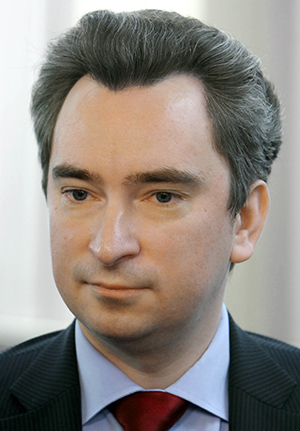
Vsevolod Yanchevsky is a Belarusian political and public person. Director of Hi-Tech Park . Advisor of the President of the Republic of Belarus Alexander Lukashenko - Head of Ideology Department of the Administration of the President of the Republic of Belarus.
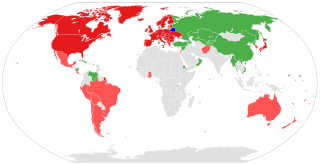
The following is a list of the official reactions to the 2020 Belarusian presidential election and the surrounding 2020 Belarusian protests.
The Israel–Sudan normalization agreement is an agreement that took place on October 23, 2020, whereby Israel and Sudan agreed that they will normalize relations. It is not clear if the deal establishes full diplomatic relations between the two nations. According to Axios reporting on March 10, 2021, "While Israel has presented Sudan with a draft agreement for establishing diplomatic relations, the Sudanese want an endorsement from the Biden administration." The agreement came after the agreements of Bahrain and the United Arab Emirates signed with Israel in September 2020. Unlike the latter two, Sudan had sent troops to fight against Israel in major Arab-Israeli wars and considered Israel an enemy state.

Natalya Ivanovna Kochanova is a Belarusian politician who has been Speaker of the Council of the Republic of Belarus since December 2019.

Belarus, a close ally of Russia, has supported its eastern neighbour in the Russian invasion of Ukraine. Before the start of the offensive, Belarus allowed the Russian Armed Forces to perform weeks-long military drills on its territory; however, the Russian troops did not exit the country after they were supposed to finish. Belarus allowed Russia to stage part of the invasion from its territory, giving Russia the shortest possible land route to Ukraine's capital, Kyiv. However, these forces withdrew within two months, thus ceasing land-based military operations originating from Belarus and resulting in the recapture of the Ukrainian side of the border region by Ukraine. Despite this, the situation along the border remains tense, with Ukraine closing the border checkpoints leading into Belarus, bar special cases.